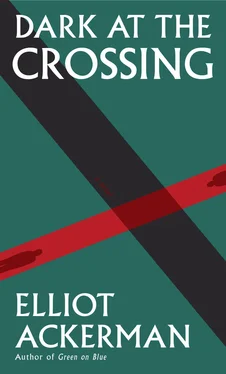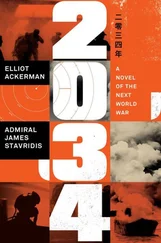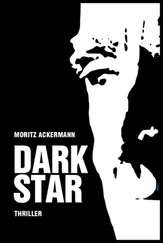He took a sip of his bitter tea, wincing a little as it burned his mouth. “There’s a truck leaving tonight for Aleppo. It’s carrying aid — medical supplies, rice, those types of things — but it’s also carrying a dozen or so laborers who came to Kilis to work for wealthy Turks, bringing wages home each month. I’ve paid off the gendarmes, that’s all settled, but the road past Azaz is contested. The regime actively patrols it. They usually don’t bother civilians who smuggle themselves through, but it is a risk.”
“You feel comfortable with that risk?” Daphne asked Athid.
“It’s not my choice to make. You’re the ones going.”
“Where will you be?” interrupted Amir.
“I’m going to Azaz but no farther.” Athid blew on his tea, making small ripples against its surface. “Right now, I have no reason to be in Aleppo.”
Daphne said nothing. She looked at Haris, her eyes asking for the assurance Athid seemed unable to provide. “How do we know the truck driver will take us the whole way?” asked Haris.
“You don’t trust me?” answered Athid.
Amir shifted in his seat.
“Not enough to give you the five thousand up front,” said Haris, “and with no assurance.”
“Assurance?”
“Collateral.”
Athid took another long sip of his tea. “Half now, half brought to me in Azaz once you get to Aleppo. Arrangements have been made. People must be paid.” He held up his cup — only half his tea was left. “As for collateral…the best I have is my companion Bashar. Jamil can take him and have the driver bring him back with the money. That’s my offer, otherwise I’ll finish this and go.”
Athid’s threat to leave unhinged something in Daphne. Before Haris could even counteroffer, she stammered: “Yes, that’s fair. Half now, half brought to Azaz from Aleppo.” She reached into Haris’s lap, where he held the thick stack of bills. She counted out what they owed Athid. Then, as she placed it in his hands, she gave him a soft, pleading look. Athid glanced back. His red, cloudy eyes seemed empty.
“For one with such a sweet appearance, your wife is quite determined,” he said to Amir, shuffling the cash as he also counted it. “The blond in her hair, her blue eyes, she looks Christian, like the Virgin Mary.”
Daphne offered a pursed, annoyed smile. She tightened down her hijab and put the rest of the money in the pocket of her trench coat. Then she sat up a bit, asserting herself. “If I look like the Virgin Mary,” she said, “you look like the Prophet Muhammad.”
Haris glanced at Athid, concerned he would take offense.
“No,” said Athid, laughing softly. “I don’t look like the Prophet, peace be upon him.” He added up the last of his cash, mouthing the arithmetic. Once he’d finished, he shuffled the bills into a neat stack, folded them, and tucked the fold into his field jacket. As he zipped up his pocket, he leaned in close to Daphne, locking her eyes with his own. A wide grin crept up his face.
“I look like the Mahdi.”
Long shadows hung from the buildings. Outside the hotel, the afternoon traffic eased in the early evening hours. The truck would pick them up past dark, and the Peugeot was parked alongside the curb, where Haris was unloading it before the sun set. He bent into the trunk, gathering his things and Daphne’s — a book bag, a suitcase, a couple of extra sweaters. Then he heard a ball bouncing behind him and Jamil’s shrill voice, breaking into a laugh.
He glanced down a dirty alley which ran the length of the hotel. There, standing beside Jamil, was Athid. The two were kicking a soccer ball against the hotel’s side, each trying to get it past the other while Bashar chased after them. Jamil’s shots were controlled and swift but lacked power. Athid’s shots were powerful but imprecise, each ringing like a detonation against the wall, intimidating Jamil, who was agile enough to block them but backed away at the last moment.
Haris watched for a few minutes. Whenever Jamil hesitated to make a block, Athid scored what must have been a point in their game. He’d then take his next shot even harder than the one before. Athid was winning handily. But he took no joy in it. He glowered at Jamil, muttering instructions about how he needed to be more aggressive, to not hesitate. Jamil listened but to little effect. No matter how quick he was, he couldn’t bring himself to place his body in front of the ball. Then, and by accident, one of Athid’s shots hit a crooked brick in the hotel’s side, causing the ball to rebound at an odd angle. The strike hit Jamil clean in the face, bloodying his nose, knocking him back.
Athid helped him up by the arm. “That’s enough for now,” he offered, suggesting they return inside.
Jamil kicked the ball again. It ripped through the air, but Athid blocked it, sending it straight back at Jamil and much harder. Jamil moved quickly, but he couldn’t maneuver his leg in front of the ball. Instead, he managed to head it back at Athid. The shot didn’t have much force, but it surprised Athid that Jamil would make the block with his head, so much so that the ball sailed past him, scoring Jamil a point.
Athid smiled.
They continued with their game. Athid took his heavy, poorly aimed shots with all the strength he had. Unafraid after being hit, Jamil now blocked each of them, his shots coming with greater speed and certainty. One by one they flew by Athid, who dove after each, incapable of blocking them. His breath became heavy with the effort. Soon Jamil had built a sizable lead. Athid refused to quit, though. He sprinted up and down the alley, his torso bent awkwardly forward, his legs unable to keep pace, until finally he tripped on a stone, toppling shoulder first into the dust. Bashar, who’d been chasing after them, sauntered to Athid’s side, licking his cheek. When Athid stood, he limped a bit. Picking up the ball, he cradled it under his arm.
“All right, you win,” he said, brushing off his clothes and tightening his keffiyeh.
Jamil apologized, though for what he seemed unsure.
Athid wrapped his arm over Jamil’s shoulders. His face exuded a warmth Haris had believed him incapable of. The two stepped out of the alley. On seeing Haris by the Peugeot, Athid cinched his arm around Jamil’s neck.
“This is a good one you’ve brought along,” said Athid.
Jamil beamed back at Haris, his face filled with the satisfaction of a little brother pleasing an older one. Haris turned away and leaned into the trunk to shove a few extra bottles of water into his book bag and Daphne’s suitcase.
Having been snubbed by Haris, Athid withdrew. His expression flattened, again becoming wide and hard as an anvil. “Let’s have a break,” he said to Jamil. “Before the truck comes, I’ll tell you something about the portraits hanging inside. Like you, they were my friends.” With his arm looped around Jamil’s neck and Bashar trailing behind, Athid led them toward the martyrs.
After packing his bag, Haris struggled to open Daphne’s suitcase. It was stuffed to the brim, and its zipper wouldn’t budge. Haris lifted the suitcase from the trunk. Setting it on the street, he noticed how heavy it was. He stood torquing on the zipper with his whole body. Finally it opened, a spare shirt and a few pairs of socks springing out. This extra clothing wasn’t the weight he’d felt. Crammed inside were nearly a dozen journals — the kindergarten lessons.
Haris glanced back at the hotel. No one was watching him. He pulled out a single volume, placing it on the fender, thumbing through the pages, each filled with Daphne’s familiar scrawl. If she found Kifa, Daphne might finally use her lesson plans. If she found nothing—
Haris wondered if she could ever abandon these journals.
Читать дальше












